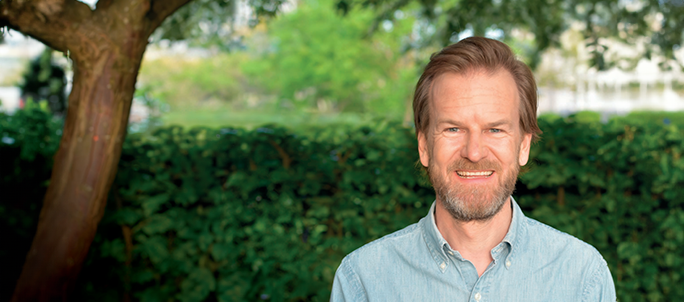
Jimmy Scavenius can recall, with lucidity, the moment at which he decided to embark on a radical pivot in his career and his life. It was while walking to accept his EMBA at IMD, in November 2013, an achievement for which he had been striving for years, and which he had financed himself. “And there it just came to me: how privileged I am… I’m born in Denmark. I’m born white, I’m born a man. It is crazy how privileged I am. And it’s so sad that we live in a world with so much potential but few opportunities for the majority.”
After working another year as a corporate lawyer in Copenhagen to pay off the loan for his study, he sold his flat, most of his belongings, and began a second career as a social entrepreneur.
He was not abandoning the leadership principles instilled by the EMBA, but rather seeking to fulfil them – with assistance from IMD. In 2016 he set up Kwera, a social enterprise that finances university places for young people in Malawi, including for many who are from low-income households. Kwera, which has offered opportunities to over 1,000 people, is a self-sustaining model – it features a tithing system in which graduates pay 10% of their earnings to the Kwera business to help the organization be self-sustaining.
The idea grew while studying for the EMBA. During the program, he was invited to address the class on a theme he had begun studying – unleashing the human capital in young people with few opportunities.
A few months later, he heard the late Professor Jean-Pierre Lehmann, during a talk about business, change the topic unexpectedly. “Suddenly he, for me, threw a bomb into the room by saying, what is it all for? And I still get goosebumps when I think about it. And I was thinking, yes, what’s it all for? Why am I in such a hurry to keep growing and make more money?”
“A dream is that in 30 years, governments will approach us”
Jimmy talks quite slowly, with thought and some deliberation. There is conscientiousness in all his actions and words, one senses. The business model for Kwera stemmed from research for his EMBA thesis. Part of the research shows the multiple benefits for communities when young people gain degrees. It reduces poverty both in the short and long-term, acting as a foundation for economic development
and prosperity.
Africa is one of the few regions of the world where the population is growing, and where the demographic is young. The World Bank projects that around one third of the world’s young people will be in Africa by the middle of the century. Currently only around 10% gain a degree.
Kwera undergraduates come from all regions of Malawi. Around 60% come from low-income households, 53% are female. Studies cover a wide range,
including nursing, midwifery, school teaching, engineering, medicine, law, social science, and nutrition.
While in aggregate there is a convincing case for increasing the number of graduates in Malawi, can there be stresses at the micro level? A graduate from a low-income household who begins a professional career could have a sense of obligation to remit much of their income home, putting them under financial pressure.
This is an issue Kwera addresses by monitoring drop-out rates and their reasons, by seeking to scale, and by building an alumni community, so that graduates benefit from of a strong peer network. Kwera has appointed a head of alumni relationships.
There is something of a leadership ecosystem developing between IMD and emerging economies in Africa. Jimmy reports the support he has received from faculty, staff, and alumni in developing his enterprise, for example content for an online skills-building program for Kwera students, a service which has been well received.
“Suddenly he threw a bomb into the room by saying: What is it all for? And I still get goosebumps when I think about it”
Kwera has plans to expand into neighboring Tanzania. For the longer term, Jimmy has aspirations for radically reimagining the way in which further education is funded. “A dream is that in 30 years, governments will approach us, stating this is the best way to fund further education and ensure employment, ultimately leading to a systemic change.”
He acknowledges the financial risks he has taken as an individual. But while he was high-achieving as a corporate lawyer, he confesses: “I was never really happy.” By a felicitous occurrence, shortly after beginning his post-corporate career, he met his future wife, a Brazilian lawyer called Paula, who happened to be sitting next to him on a flight. They now have a son.
While his radical career change would not suit everyone, Jimmy does issue advice for Kwera students and for others: “Don’t walk around thinking other people have a plan for you, because they don’t – they don’t even have a plan for themselves. You need to be in charge of your own life.”


